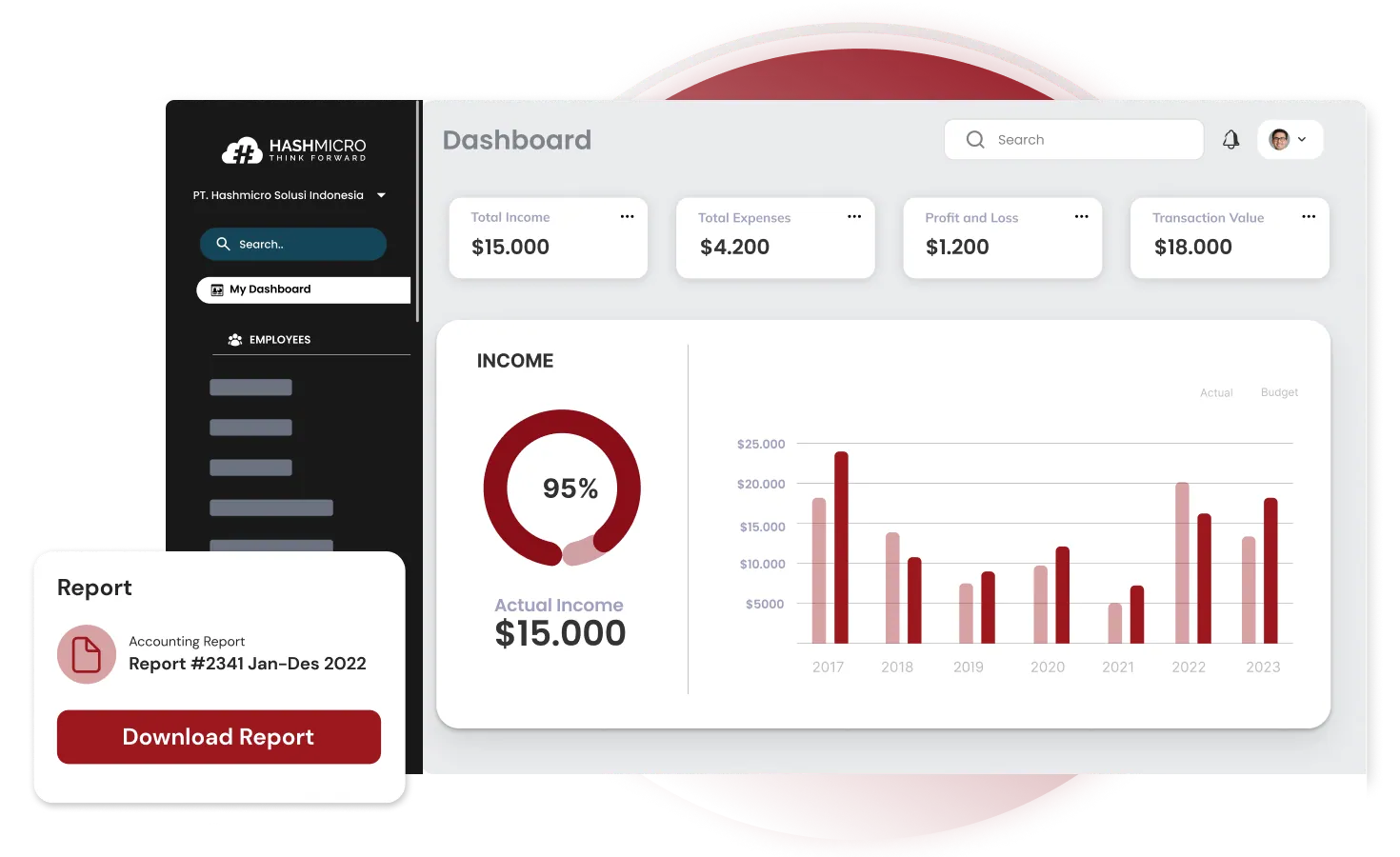Many businesses struggle to utilize financial data to support their decision-making effectively. Without a robust managerial accounting system in place, aligning financial insights with strategic goals poses a significant challenge, resulting in inefficiencies and missed opportunities.
Reflecting this growing need, Singapore’s accounting software market is expected to grow at a 4.2% compound annual growth rate (CAGR) from 2025 to 2031, driven by digital adoption, automation, and increasing regulatory demands.
HashMicro Accounting addresses these challenges by providing tools that simplify financial reporting, budgeting, and informed decision-making. Its automated features enhance the accuracy and reliability of managerial accounting processes, enabling businesses to stay competitive and agile.
In this article, we’ll dive deeper into how managerial accounting can overcome common business hurdles and why HashMicro Accounting is an ideal solution to help you strengthen your financial strategies.
Table of Content:
Table of Content
Key Takeaways
|
What Is Managerial Accounting?
Managerial accounting is the practice of providing financial information for internal business use. It helps organizations make informed decisions by analyzing, interpreting, and reporting relevant economic data.
Unlike financial accounting, which focuses on external reporting, managerial accounting helps businesses plan, control operations, and optimize performance by providing relevant financial insights.
Managerial accountants play a crucial role in this process by collecting and analyzing financial information to assist management in budgeting, forecasting, and performance evaluation.
They prepare internal reports, assess cost structures, and identify financial trends to improve efficiency and profitability. Their work ensures that decision-makers have access to accurate and timely data, enabling them to enhance business strategies and drive sustainable growth.
Financial vs. Managerial Accounting
Financial accounting and managerial accounting both deal with economic data but serve different purposes. Financial accounting is focused on providing external stakeholders, like investors and regulators, with standardized reports such as balance sheets, income statements, and cash flow statements, following strict guidelines like GAAP or IFRS.
In contrast, managerial accounting serves internal users, such as managers, by providing detailed and flexible reports tailored to specific business needs, including cost analyses, budget forecasts, and performance evaluations.
While financial accounting is primarily concerned with summarizing past performance for external assessment, managerial accounting is aimed at supporting decision-making and strategy formulation within the organization.
The key difference lies in the audience and the flexibility of the reports, with financial accounting being more rigid and periodic, and managerial accounting being more dynamic and focused on real-time or future data.
Principles of Managerial Accounting
Managerial accounting is guided by a set of core principles that ensure financial insights are accurate, practical, and supportive of sound decision-making. Below are the fundamental principles that define managerial accounting:
1. Causality principle
This principle emphasizes the direct relationship between costs and the activities that cause them. Understanding this link enables more accurate cost allocation and deeper insight into how expenses behave across various operations.
2. Transparency principle
Clear and detailed financial reporting is a cornerstone of managerial accounting. Transparent data empowers managers to base their decisions on trustworthy, well-documented information.
3. Consistency principle
Consistently applying the same accounting methods over time is crucial for maintaining reliable financial tracking. Consistency enables meaningful comparisons and supports accurate evaluation of costs and performance.
4. Relevance principle
Managerial accounting focuses on delivering information that is directly applicable to internal decision-making. Reports are tailored to provide meaningful, actionable insights for planning and strategy.
5. Timeliness principle
Speed matters in internal reporting. Timely access to financial data enables businesses to respond promptly to operational changes and adjust their strategies before issues escalate.
6. Control & accountability principle
This principle promotes responsible use of financial resources. It supports internal controls, ensures budgets are followed, and helps monitor the performance of departments or units.
Understanding these principles enables businesses to enhance their financial planning, optimize cost management, and make more informed decisions. Interested in boosting your financial efficiency? Download our pricing guide to explore how HashMicro can help.
Types of Managerial Accounting
There are several types of managerial accounting, each designed to support internal business functions with relevant financial insights. These types enable organizations to manage costs effectively, plan strategically, and enhance operational performance.
1. Cost accounting & product costing
This type focuses on tracking and analyzing production costs. By understanding how resources are consumed, businesses can price products effectively and maintain control over expenses through accurate cost allocation.
2. Budgeting, forecasting & trend Analysis
Budgeting sets financial limits, while forecasting anticipates future performance. Combined with trend analysis, this type helps companies stay ahead of market changes and make informed spending and planning decisions.
3. Cash flow management & financial analysis
Monitoring cash flow ensures a business can meet its obligations and maintain financial stability. Financial analysis, which includes the use of key ratios, provides a deeper insight into profitability and overall financial health.
4. Accounts receivable & working capital management
This type deals with managing short-term assets and incoming payments. It helps businesses maintain liquidity by ensuring timely collections and efficient handling of current assets and liabilities.
5. Performance evaluation & operational efficiency
Focusing on productivity and output, this type utilizes tools such as inventory turnover rates and bottleneck analysis to identify inefficiencies. Benchmarking against industry standards highlights where improvements are needed.
6. Strategic planning & decision-making support
Managerial accounting also contributes to high-level business decisions. Capital budgeting and opportunity cost analysis help leaders evaluate investment options, optimize processes, and plan for long-term growth.
Managerial Accounting Topics
Managerial accounting encompasses a diverse range of methods used to assess financial health, control expenditures, and inform business decisions.
These core topics offer valuable insights that enable organizations to enhance efficiency, increase profitability, and align with their long-term objectives. Below are some of the most critical issues in managerial accounting:
1. Variance analysis
This topic focuses on comparing actual results with planned budgets to highlight any gaps. It helps businesses identify where and why costs diverged from expectations, improving forecasting accuracy and financial oversight.
2. Break-even analysis
Break-even analysis calculates the point at which revenue matches total costs. Understanding this threshold enables businesses to refine their pricing models, manage both fixed and variable costs, and accurately assess their profit potential.
3. Financial statement analysis
By examining income statements, balance sheets, and cash flow reports, managers gain a clearer picture of the company’s financial position. This analysis supports decisions related to liquidity, profitability, and financial sustainability.
4. Opportunity cost evaluation
This technique helps assess the benefits of one option over another when resources are limited. It ensures that businesses choose the most advantageous path when faced with multiple investment or operational alternatives.
5. Constraint identification and analysis
This topic focuses on finding and resolving operational bottlenecks that hinder productivity. Addressing these constraints helps streamline processes, enhance output, and optimize the use of available resources.
Management Accounting Basic Framework
The framework of management accounting provides a systematic approach to gathering, analyzing, and applying financial information. Below are the core elements that make up this framework:
1. Data gathering & record maintenance
The process starts with collecting both financial and operational data. Maintaining accurate and detailed records is essential for reliable analysis in forecasting, budgeting, and cost control efforts.
2. Cost categorization & distribution
Expenses are sorted based on characteristics such as type, behavior, and function. Accurate cost assignment enables companies to gain insight into their spending, manage pricing strategies effectively, and improve cost efficiency.
3. Financial planning: budgeting & forecasting
Through structured budgeting and forward-looking forecasting, businesses can effectively plan the use of their financial resources. These tools help anticipate income, distribute funds appropriately, and stay prepared for economic uncertainties.
4. Performance tracking & variance Evaluation
Using KPIs along with variance analysis, companies compare actual outcomes to planned goals. This helps pinpoint areas of inefficiency and informs adjustments to enhance performance.
5. Decision support & strategic guidance
Management accounting provides the insights necessary for informed decisions, such as pricing, investment, or resource allocation. Techniques like opportunity cost and break-even analysis support long-term planning and growth strategies.
6. Internal oversight & risk control
A strong framework also includes internal controls that protect company assets and reduce exposure to financial risk. These practices ensure compliance and promote smooth, efficient operations.
Scope of Managerial Accounting
Managerial accounting plays a crucial role in business operations by transforming financial information into actionable guidance for informed internal decisions. The following points highlight the main areas within its scope:
1. Dependent on financial records
Managerial accounting draws insights from financial accounting data. Reliable financial statements are essential, as they provide the foundation for planning, analysis, and decision-making.
2. Goes deeper than financial results
Rather than merely reporting figures, managerial accounting examines the underlying factors that drive financial outcomes. It helps uncover reasons for cost changes, variations in profit margins, and shifts in operational performance.
3. Applies practical financial tools
This area incorporates tools such as marginal costing, standard costing, and investment analysis. These techniques make complex figures more comprehensible and support more effective budgeting and resource allocation.
4. Evaluates historical and current Data
By examining both past performance and current conditions, managers gain a clearer picture of what is working. This helps fine-tune strategies and strengthen financial planning.
5. Supports planning and performance monitoring
Managerial accounting helps define business objectives and develop strategies to achieve them. It also evaluates how teams or departments perform to those goals.
6. Focuses on forecasting and solutions
Beyond tracking outcomes, it helps predict future financial scenarios and offers guidance for overcoming potential problems. Its proactive approach equips managers with insights to reduce risk and improve decision-making.
Techniques in Managerial Accounting
Managerial accounting employs various techniques to assess financial performance, manage costs efficiently, and inform internal decision-making. These approaches enable organizations to enhance profitability and streamline operations. Here are some commonly used techniques:
1. Marginal costing
This technique calculates the cost of producing one additional unit. It helps businesses determine the financial impact of scaling production and supports short-term pricing and output decisions. Marginal costing is particularly useful when analyzing cost behavior and optimizing profits.
2. Standard costing
Standard costing establishes expected cost levels for resources, including labor, materials, and overhead. By comparing actual expenses with these standards, companies can detect variances, manage costs more effectively, and refine production planning.
3. Budgetary control
This method focuses on creating budgets and tracking actual performance against them. It enables companies to allocate funds efficiently, control spending, and stay aligned with strategic goals. Budgetary control also helps maintain a healthy cash flow and promotes financial discipline.
Limitations of Managerial Accounting
Despite its usefulness in supporting internal decisions, managerial accounting has certain drawbacks that businesses should be aware of. Recognizing these limitations is essential for applying its practices wisely and effectively. Below are some of the main challenges:
1. Dependent on assumptions
Techniques like forecasting and budgeting often rely on assumptions and projections. If these estimates are inaccurate, they can mislead planning efforts and result in flawed financial decisions.
2. No universal Standards
Unlike financial accounting, there’s no standardized framework for managerial accounting. This lack of consistency across organizations can make comparisons and benchmarking more difficult.
3. Intended for internal use
Since the primary purpose is to assist internal management, managerial accounting does not adhere to external reporting standards. This makes it less relevant for outside stakeholders like investors or regulatory bodies.
4. Resource-intensive
Implementing and maintaining a managerial accounting system can be time-consuming and expensive. Smaller businesses, in particular, may face challenges due to limited resources or technical expertise.
5. Risk of subjectivity
As reports are generated within the organization, they may be influenced by internal opinions or biases. This can compromise the objectivity of insights and lead to decisions that don’t fully reflect financial realities.
Managerial Accounting in Practice
Managerial accounting plays a crucial role in enabling companies to effectively manage costs, support strategic planning, and make informed business decisions. In the Philippines, businesses ranging from small and medium enterprises (SMEs) to large corporations apply these practices to improve efficiency and profitability.
Research published in the Corporate Sustainable Management Journal, conducted by Joseph Alfred M. Reyroso and his team in Quezon province, explored how SMEs implement managerial accounting in areas like costing, planning, control, and strategic decision-making.
The study involved 363 SMEs, of which 158 actively participated. Findings revealed that costing was widely applied, particularly in determining pricing and assessing profitability. Cost-related data helped guide the development of products and services, ensuring that pricing strategies aligned with profit goals.
Planning and control practices were also widely used. These methods enabled SMEs to define success indicators, track progress, and gather feedback to align their operations with strategic plans. Leveraging financial insights for strategic decisions gave these businesses a competitive edge.
The research underlines the importance of managerial accounting in driving growth for Philippine SMEs. If larger companies adopt similar approaches, the potential gains in operational performance and strategic alignment could be even more substantial.
You can also read our article on the best accounting software to discover more solutions that support effective financial management.
Streamline Managerial Accounting with HashMicro’s Accounting Software
Practical managerial accounting requires accurate data, timely reporting, and efficient resource management. However, manual processes often lead to delays, errors, and missed opportunities. Today, businesses require reliable tools to streamline financial analysis.
HashMicro Accounting offers a comprehensive solution to streamline managerial accounting tasks. With automated data collection, real-time reporting, and customizable dashboards, it empowers managers to make faster, data-driven decisions.
- Forecast Budget: Enhance the budgeting process by leveraging historical financial data and future projections, thereby making resource allocation more strategic and practical.
- Financial Statement with Budget Comparison: Display actual financial results alongside budgeted expectations, enabling businesses to identify variances and assess their financial health.
- Budget S Curve: Visualize budget consumption over time through an intuitive S-curve chart, allowing easier tracking of spending trends versus original plans.
- Cash Flow Reports: Provide a clear and detailed overview of cash inflows and outflows, enhancing liquidity management and supporting more informed financial decisions.
- Automated Currency Update: Automatically refresh foreign exchange rates from trusted sources, ensuring accuracy in international transactions without manual adjustments.
Conclusions
Managerial accounting is crucial for transforming financial data into actionable insights that inform more informed planning, decision-making, and operational control. Unlike financial accounting, which focuses on external reporting, managerial accounting empowers internal teams to drive efficiency.
Given its importance, having the right tools to manage financial data accurately and efficiently is critical. Managerial accounting enables businesses to forecast budgets, monitor cash flow, control costs, and enhance performance across all departments.
HashMicro Accounting provides a powerful solution to streamline all aspects of managerial accounting. With features such as automated cash flow reporting and budget forecasting, HashMicro ensures that your business decisions are always informed by data and made on time.
Ready to take your financial management to the next level? Book a free demo with HashMicro today and discover how you can optimize your managerial accounting processes effortlessly.
FAQ About Managerial Accounting
-
What best describes managerial accounting?
Managerial accounting breaks down costs, evaluates production efficiency, predicts the impact of decisions, and monitors performance against objectives, focusing on answering specific management needs rather than adhering to strict external reporting standards.
-
Is GAAP a managerial accounting?
While financial accounting adheres to Generally Accepted Accounting Principles (GAAP) for consistency and comparability, managerial accounting offers more flexibility. It prioritizes delivering relevant and timely information for internal users, without being bound by rigid reporting standards.
-
What are the objectives of managerial accounting?
The goal of management accounting is to assist businesses in utilizing their financial data for effective planning, informed decision-making, and achieving their financial objectives. To interpret this data, they compare it, calculate ratios, and forecast potential trends.

























































